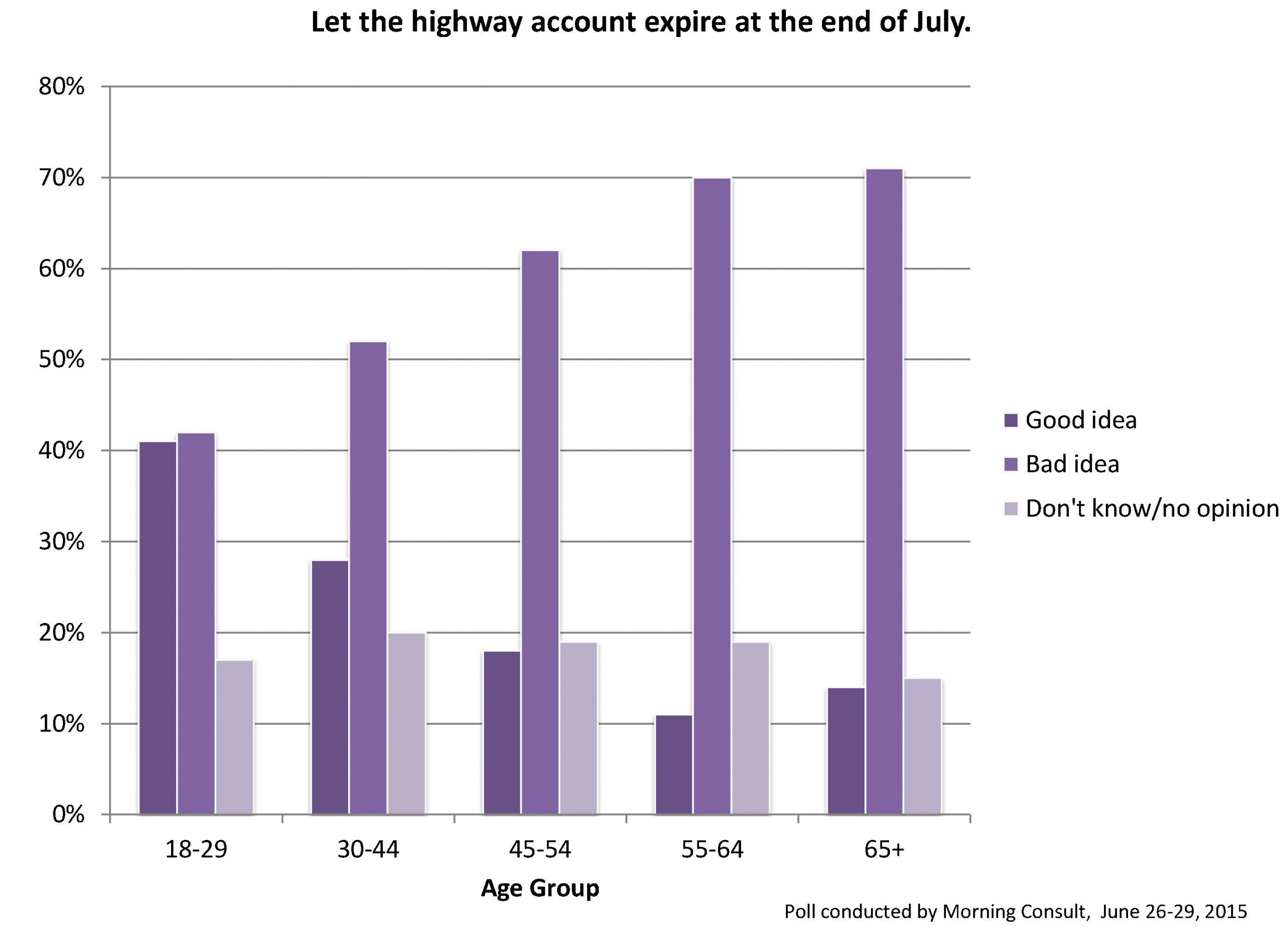
Millennials Are OK with the Gas Tax, But Don’t Much Care About Highways
The political viability of the nation’s current model of transportation policy – which ties revenue for and spending on highways to gas taxes – is dependent on a Millennial generation that is ambivalent about whether we should be spending money on highways in the first place.
Raising the gas tax has joined cutting Social Security as a “third rail” of American politics. Despite a widening gap between gas tax revenues and transportation expenditures at the federal level, the idea of hiking the federal gas tax remains a political non-starter.
A few new polls are out that shed light on Americans’ sentiments about the gas tax and the way transportation funds are spent, including how attitudes toward transportation funding differ among the generations. Here are some key take-aways:
1) Millennials Are Most Likely to Support a Gas Tax Increase …
Polls by the Mineta Transportation Institute and the firm Morning Consult[1] (PDF) both show young adults to be more accepting of gas tax increases than people of any other age group. According to the Mineta poll, 37 percent of 18 to 24 year-olds would support a 10-cent increase in the federal gas tax, compared with just 28 percent of those 55 years of age and older.
The Morning Consult poll yielded similar results, with 50 percent of 18 to 29 year-olds stating that it was a “good idea” to raise the gas tax to fund the federal highway account, as opposed to just 32 percent of 45 to 64 year-olds and 35 percent of those 65 years of age and up.
2) … But Seem to Be Ambivalent About Highways
Perhaps the most eye-popping finding of the Morning Consult poll came in response to the question of whether it was a good or bad idea to “let the [federal] highway account expire at the end of July”.
Only 22 percent of registered voters thought it was a good idea to simply end the federal highway program later this month. For an idea that was politically unthinkable just a few years ago (and may still be unthinkable today), that’s not surprising.
Shockingly, however, among 18 to 29 year-olds, 41 percent thought it was a good idea to let the highway account expire. Indeed, when “don’t know/no opinion” responses are excluded, opinion on whether to keep a federal highway program was evenly split among young adults. By contrast, among those older than 55, opinion ran more than five-to-one in favor of keeping the highway account. (See Figure below.)
Figure. Support for Allowing Federal Highway Account to Expire (Data: Morning Consult, PDF)

Millennials also tend to put a higher priority on investments in public transportation. The Mineta poll found that roughly two-thirds of Americans support using a share of gas tax revenue for public transit – a figure that rises to 77 percent among 18 to 24 year-olds. And a 2014 ABC News/Washington Post poll found that people aged 18 to 39 preferred that the federal government focus on transit expansion – rather than highway expansion – as a means to deal with traffic congestion by a margin of 62 percent to 36 percent.
3) No One Is in Love with Highway Expansion
A third poll out recently, this one from the Associated Press (PDF), asked whether people thought government should prioritize maintaining existing roads and transit systems, expanding those systems, or just keeping things the same. With regard to highways, less than a quarter of all respondents thought the government should prioritize expansion, compared with the nearly two-thirds who believed in prioritizing highway maintenance.
The public’s support of maintenance over new capacity dovetails with the results of the Mineta survey, which found that increases in the gas tax explicitly linked to road and street maintenance were by far the most popular alternatives. Support for a 10-cent gas tax increase jumped from 31 percent to 71 percent, the Mineta survey found, when revenues were dedicated solely to maintenance of roads and streets.
4) Everyone Loves Transportation When Someone Else Is (Perceived to Be) Paying for It
In addition to asking about hiking the gas tax and letting the highway program expire, the Morning Consult poll asked whether respondents would favor funding the highway account by taxing corporations’ overseas profits. Nearly two-thirds of respondents backed that idea – which was unlikely to cost any of them a dime, at least directly – with high levels of support among all age groups. Of course, the poll did not ask whether respondents would rather use that money – which is general tax revenue, not money derived from highway users – on transportation than on other public purposes such as education or health care.
Similarly, in the Mineta poll, the most popular option for increasing spending on public transportation remains reducing spending on other (unspecified) federal programs. In that poll, support for raising the gas tax tends to be highest among those who don’t drive at all and lowest among those who drive the most and among those who don’t use transit.
What does all of this tell us? I don’t want to speculate overly on why Millennials’ responses might differ from those of other generations, though we’ve written quite a bit in recent years about the evolving transportation preferences and behaviors of young adults.
But the results do lead to a few observations:
1) The leading supporters and beneficiaries of the federal highway program – older Americans and those who drive the most – are the least willing to pay more (at least in gas taxes) to keep that program going. If you are looking for the root cause of the political stalemate on transportation funding, this is a good place to start.
2) The political viability of the nation’s current model of transportation policy – which ties revenue for and spending on highways to gas taxes – is dependent on a Millennial generation that is ambivalent about whether we should be spending money on highways in the first place.
3) If the American people once understood the (much exaggerated!) connection between the money they pay in gas taxes and the highways they use, they sure don’t anymore.
4) A gas tax increase focused solely on maintenance might be more viable than one perceived to foster the addition of lots of new highway capacity.
5) The Morning Consult poll, unlike many others in recent years, asked about respondents’ opinions about “highways” – not “transportation” – and did not mention that the Highway Trust Fund also funds transit. I wonder how much of a difference that small shift in wording might have made in the results.
This new wave of polling shows, in many ways, just how screwy the transportation debate has become. The case for starting over from scratch – developing a new federal transportation policy and funding system that meets the needs of the 21st century, while accounting for the emerging preferences of the Millennial generation – is stronger than ever.
(A big tip of the hat to Robert Puentes of the Brookings Institution, who flagged the Morning Consult poll on Twitter.)
[1] Morning Consult is a firm with which I wasn’t familiar previously and which uses online polling for much of its results. As always in interpreting polling results, caveat emptor!
Authors
Tony Dutzik
Associate Director and Senior Policy Analyst, Frontier Group
Tony Dutzik is associate director and senior policy analyst with Frontier Group. His research and ideas on climate, energy and transportation policy have helped shape public policy debates across the U.S., and have earned coverage in media outlets from the New York Times to National Public Radio. A former journalist, Tony lives and works in Boston.
